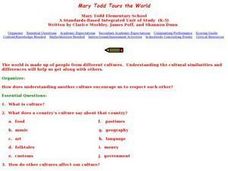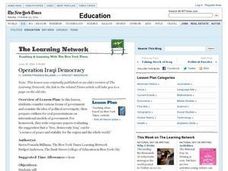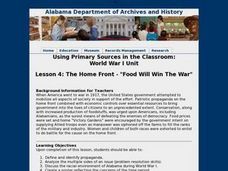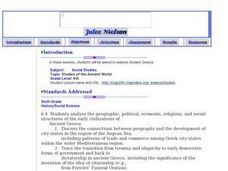Curated OER
Mary Todd Tours the World
Pupils analyze how distinguishing another culture encourages us to respect each other. They research culture and all its avenues, recognizing and comprehending the relationship between people and geography. Ultimately, they can apply...
California Polytechnic State University
Australian Geography Unit
At the heart of this resource is a beautifully detailed PowerPoint presentation (provided in PDF form) on the overall physical geography of Australia, basic facts about the country, Aboriginal history, and Australia culture and lifestyle.
DocsTeach
WWI Propaganda and Art
Uncle Sam wants you! During World War II, the US government and military created a propaganda campaign to gain public support. The activity uses primary documents such as photos to explain how and why the propaganda campaign was...
Curated OER
Protecting Your Identity--and Helping Other Protect Theirs
Students create a presentation explaining how they can guard against identity theft. Prior to creating the presentation, students research identity theft: how it occurs, how to avoid it, what to do when someone thinks it has happened to...
Curated OER
Art and Patriotic Culture
Art forms, especially government-sponsored "poster art", very effectively conveyed specific cultural values during World War II. Understanding the role that visual images play in expressing issues and ideas is critical to developing...
Curated OER
Operation Iraqi Democracy
In this lesson, students consider various forms of government and examine the idea of political sovereignty, then prepare outlines for oral presentations on international models of government. For homework, they write response papers...
Curated OER
Hitler¿¿¿s Fatal Gamble ? Comparing Totalitarianism and Democracy
Students compare/contrast totalitarianism and democracy and examine their roles in World War II. They read a handout, complete a Venn diagram, and participate in a class discussion.
Curated OER
Wilson's 14 Points
Students analyze political cartoons representing the role of the U.S. in the Post-World War One Era. They work in groups and analyze cartoons for their stereotypes, symbols, and caricatures. After analyzing them, they complete a...
Curated OER
President Wilson and the League of Nations
Students examine Wilson's ideals of world peace and world order and the conflict between these ideals and the U.S. Senate's policy of isolationism. Wilson's visionary stance and its significance in forming the policies of our government...
Curated OER
Interning Japanese Canadians
Students create a time line of the Japanese Canadian internment of World War II to the apology of the government in 1997. In this World War II lesson plan, students identify historical events in sequence.
Curated OER
The Home Front - "Food Will Win The War"
High schoolers define and identify propaganda. They analyze the multiple sides of an issue (problem resolution skills), then discuss the racial environment of Alabama during World War I. They reate a poster reflecting the concerns of the...
Curated OER
Comparison of Political Ideologies in the Context of Constitutional Preambles
Young scholars examine the various philosophies that form the foundations of political systems of major world countries.
Curated OER
Causes of WWI-Introductory Lesson
Sixth graders identify the causes of World War I. In this World War I history lesson, 6th graders view a Powerpoint to develop background knowledge about World War I. Students make a picture map of the events that led to war and describe...
Curated OER
Studies of the Ancient World
Sixth graders, after taking a pretest, write a paragraph describing the difference between Athens and Sparta and write an article about the ancient Phoenicians, describing their contributions to world history. They compare democracy in...
Curated OER
Turning the Tide in Europe, 1942-1944
Learners identify the reasons why the U.S. government decided to focus on the defeat of Germany and Japan and assess the wisdom of this decision. They analyze the magnitude of the U-Boat threat in the Atlantic.
Curated OER
H4 Homework Assignment #22-23
In this global studies activity, students read the noted pages in their textbooks and then respond to 8 short answer questions about Japanese involvement in World War II.
Curated OER
My Way or the Highway
Students read "Saudis Uneasily Balance Desires for Change and Stability" from The New York Times and discuss Saudi Arabia as it considers a change from monarchy to democracy. Students work in groups to research and create timelines on...
Curated OER
International Festival - Cultures of the World Research Projects
Seventh graders identify common elements of cultures from around the world. They create a group research project, which illustrates the elements of culture from a specific country of the Eastern World. Finally, they compare these...
Curated OER
World Day Against Child Labour
For this world day against child labour worksheet, students read or listen to the passage, then match phrases, fill in the blanks, choose the correct words, unscramble words and sentences, put sentences in order, write discussion...
Curated OER
US Government: Supreme Court
Students explore the powers of the Supreme Court. In this Judicial Branch activity, students define vocabulary regarding the branch's responsibilities, take notes on a video regarding the branch, and discuss the powers of the branch in a...
US Institute of Peace
Organizations Working for Peace
We're all in this together! Show young scholars that peace is a process and having the support of like-minded people can make it happen. 13th in a series of 15 peace building activities, groups conduct research on a peace organization,...
Curated OER
EU Simulation: The European Council
Discover how government and the European Union works with this interactive activity. Small groups form to represent a country and create a profile. The instructor presents an issue to discuss and potential politicians then develop...
Curated OER
The Odds of Dying During a Plague
Sixth graders explore plagues in the middle ages. In this social studies lesson, 6th graders examine the impact of deadly plagues on past societies and how the governments were forced to make drastic changes in response to the plagues

























